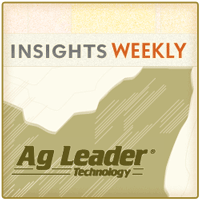 The evolution of precision ag has impacted how growers and ag professionals accomplish many tasks. We’ve seen in-field crop scouting evolve from a notepad and pencil, to a GPS enabled tablet/mobile device to simply record crop and pest observations. Is it adequate for you to just document observations? Want to precisely navigate to each hybrid planted? Want to navigate to particular treatment zones? Need to navigate to an area that you’ve been struggling with in previous years?
The evolution of precision ag has impacted how growers and ag professionals accomplish many tasks. We’ve seen in-field crop scouting evolve from a notepad and pencil, to a GPS enabled tablet/mobile device to simply record crop and pest observations. Is it adequate for you to just document observations? Want to precisely navigate to each hybrid planted? Want to navigate to particular treatment zones? Need to navigate to an area that you’ve been struggling with in previous years?
Being able to reference valuable precision ag data from multiple field operations and years is critical to know where and how to scout. This reference information, along with recorded observations, will help you better comprehend the right management decisions to maximize your operations profitability.
Luke James, Ag Leader Software Sales Manager, says growers can record all their scouting observations, crop growth status, etc., then use those records to write a targeted prescription or have it to reference at a later date.
[wpaudio url=”http://precision.agwired.com/wp-content/uploads/sites/3/2014/05/JamesScouting1.mp3″ text=”Listen to James explain”]
James also says it’s real-time data referencing.
[wpaudio url=”http://precision.agwired.com/wp-content/uploads/sites/3/2014/05/JamesScouting2.mp3″ text=”Listen to James explain”]
James explains how SMS Mobile will save growers time, help them be more efficient, and add money to your bottom line.
[wpaudio url=”http://precision.agwired.com/wp-content/uploads/sites/3/2014/05/JamesScouting3.mp3″ text=”Listen to James explain”]
The SMS Mobile Software provides you with the flexibility of displaying multiple reference maps at once while crop scouting. SMS desktop software users can export nearly everything in their software, including data from different brands of equipment to SMS Mobile for in-field viewing.
Interested in learning more about SMS Mobile? Please visit our website to learn more, sign up for a free introduction to SMS Mobile webinar, download a free trial version of SMS Mobile or contact us at 515-232-5363 or SMSsupport@agleader.com or reach out to a local Ag Leader Dealer.
Become a fan of Ag Leader on Facebook today, and get the latest precision ag videos on the YouTube channel. For more information about Ag Leader products and services, or to visit the blog site, go to www.agleader.com.
 When I think about the importance of using technology in agriculture today, the systems used for planting, harvesting, and even crop scouting are some of the first things that come to mind. But what about after you’ve planted and harvested that crop and you have it stored on your farm?
When I think about the importance of using technology in agriculture today, the systems used for planting, harvesting, and even crop scouting are some of the first things that come to mind. But what about after you’ve planted and harvested that crop and you have it stored on your farm?

 The evolution of precision ag has impacted how growers and ag professionals accomplish many tasks. We’ve seen in-field crop scouting evolve from a notepad and pencil, to a GPS enabled tablet/mobile device to simply record crop and pest observations. Is it adequate for you to just document observations? Want to precisely navigate to each hybrid planted? Want to navigate to particular treatment zones? Need to navigate to an area that you’ve been struggling with in previous years?
The evolution of precision ag has impacted how growers and ag professionals accomplish many tasks. We’ve seen in-field crop scouting evolve from a notepad and pencil, to a GPS enabled tablet/mobile device to simply record crop and pest observations. Is it adequate for you to just document observations? Want to precisely navigate to each hybrid planted? Want to navigate to particular treatment zones? Need to navigate to an area that you’ve been struggling with in previous years?





